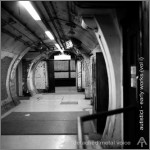
(August 2010) David Newman embarks on a retrospective of his embryonic
sound world, prompted perhaps by having completed a decade of exploratory
endeavour, wanting to take stock of his developmental trajectory.
Autistici’s nascent voice emerges somewhat croakily on Detached Metal Voice
– Early Works (Vol. 1), ‘a collection of early works exploring the raw
extrusion of the human condition‘. In keeping with its theme, these are
more discomfiting scenarios than in his more mature work, the tone set by
a harsher retro-futurist sonology. We’re in territory where the now tired
epithet experimental reverts to a previous signification; difficult. The clinical psychologist (Newman’s day-job) is more of an
auteur here, musical vehicle affording a channel for re-processing elements
of his experiential world through abstract sound. For the listener the album is
likely to work differently from Newman’s almost therapeutic deployment; in
fact, with euphonic considerations decidedly on hold, the unsuspecting
listener may be in for a rough audio-ride.
The eponymous voice (incl. Bell Laboratories’ voice synthesis experiments of the 60s/70s) incides in
dislocated fragments consorting with DIY synths and sinewave oscillators
and a cornucopia of sonic detritus in diverse, faintly dystopian, settings.
Specific pieces manifest a shifting skittish nature, like “Morphine
(Detail)” with its electroacoustic classical bricolage, whirled up with
combustion and synth-squeals, vocal cut-ups and sound poetry. “On A Beach
Of Pure Data” opens the collection with the faintly malevolent flutter and
whirr of malfunctioning shards cohering into flickering occasionally
accidental rhythms, like a chance encounter of errant machinery acted out
to a backdrop of ominous synthetics. “Colonic People” lets a dyspeptic
jazzband slowly, queasily, be submerged under caustic infusions of noise
and reverb, rnadom PA verbiage and digi-squalls. In contrast, “Whispering
Mongo Man” reduces John Lennon to the breath between words in a miasma of
pitched-down phonology and insectoid chatter. “It Contains a Diagnosis”
sidles up like a mutant Autech-funk replicant, pulsing with a kind of
metallic beat’n’bleep patter, versions of which present elsewhere.
Throughout proceedings are tinted with a self-conscious tension in a sort
of surreal elision of ambient soundscape and found sound stretched into ill
whimsy and knowingly sinister mood music a la Chris Morris’s Jam, as male, female, ovine and bovine
babble are lightly drizzled or heavily mashed into ‘an abstract narrative
exploring the anxiety of disconnected elements striving to find connection
in a world of digital communication.’ (sic)
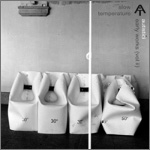
Though Slow Temperature – Early Works (Vol. 2) features music from a
similar period of Austici’s infancy, its demeanour is discreetly different.
Less mannered and self-conscious in its courting of ‘darkness’ or outright
weirdness, it suggests a transition towards the more approachable, though
by no means docile, sound with which the project may be more associated
(cf. 2008’s 12k coming out). The palette of
abstract ambience, with its microsonic sculpting of source sounds derived
from quotidian objects familiar from that, his best known release, is well
in evidence, seguing from the pitch-shifted tones and warped ambient
backdrop of an Asian dawn chorus (‘Waking The Sky’) to the drones and
phonographic-mekanik of “Soft Grey Generator”; from “Cutlery”‘s kitchen
drawer realia to animalia against a peculiarly ambiguous rural ambience on
“Farm”. Artistic ambit is increasingly that of interplay between silence,
space and sound. There is also a notable propensity for greater subtlety in
his sound-collagism, evident in the minute bursts of electronics infusing a
more composed whole in “Stone Steps Into Water” and “Projections From A
Prayer”. And “Carved from Lips” signals more of an ear for something
approaching harmonic sensibility, albeit wilfully forsaken for uneasy
atonalism as soon as the listener feels too comfily aligned with its
lulling contours. “Meditation on Distance” is similarly perched between
outwardly blithe spirit and a slow fall inward, its surface organ harmonies
woozily bending, riddled with tiny glitch-darts and digi-fissures. Overall,
Newman here exhibits a more cultured take on experimental sound engineering
with these enigmatic electroacoustic vignettes. Over the two early works,
Autistici’s nature reveals itself, if not red in tooth and claw, certainly
less refined, and, particularly on Slow Temperatures, none the worse for
it, properly ‘experimental’ in the truest sense of playing around with
sound to see how it comes out, and exploring various musico-transformative
possibilities.
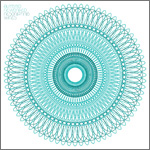
Finally, there’s Autistici Reworked: Resonating Wires, on which a variety
of sonicians, ambient and otherwise electronic, are convened for reworkings
of an Autistici track from 2009’s Complex Tone Test (Kesh). The original
“Resonating Wire” found him taking the eponymous slender strand for a
crepitant consitutional, having it captured and raptured in a pointillist
forest of fuzz-buzz, cello and xylo, and digitized domestica. Here it gets
a further, more extended, outing, in which it is comprehensively unpacked
and variously reassembled into a series of tracks exploring time-space (and
possibly the-universe-and-everything) relations, etc. It may not achieve
transcendence from a collection of disparate interpretations to wholeness,
but there are enough interesting landmarks within it. There’s quite a gulf,
though, to get between these – from the tenebrous shoeless-gaze of Simon
Scott’s microsonic DSP-eration to the comforting deep rumbling swirls and
rhythmic noise of a ripped and torn tract from a by no means totally atonal
Francisco López. In between, less forbidding, almost light-skipping terrain
is traversed – through the over-ingratiating melodic IDM-flirting
“Telephone Lullaby” of Bluermutt, via the J-pop twee-tronica of Sawako, to
the twinkling elegiac overtones of Jimmy Behan, the last mentioned
something of a pleasant relief from the preceding flimsiness with its more
ambiguous mood. Then, again, between leaving López land and becoming
transfixed in the zone of Richard Chartier’s “Wire.Re,” which executes a
customarily artful descent into a place where pitched sound evaporates and
the comfort of the harmony-noise polarity is unsettled, there’s the more
homely territory of ISAN and Ian Hawgood & Danny Norbury; the former’s
broken toy instrument cupboard is raided once again for a typically
happy-sad version, while the latter duo have cello-meister DN breaking out
with plangent string saws and bass plucks, to IH’s cascade of crackle and
tinking keys. After Chartier’s more internal odyssey, He Can Jog prefers to
close down by opening out into a more direct appeal, his “Chorale Mix”
couched cracklingly and crumblingy in a froth of fragmented keyboard
dreams. Overall a well-turned assemblage of minimal, experimental and
electro-acoustic soundscapes augmenting the savoury primo and secondo of
Autistici’s early works with a sweet terzo.
All releases above are out now on Audiobulb. [Listen | Purchase]







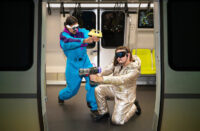
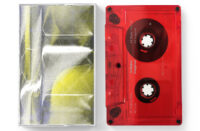

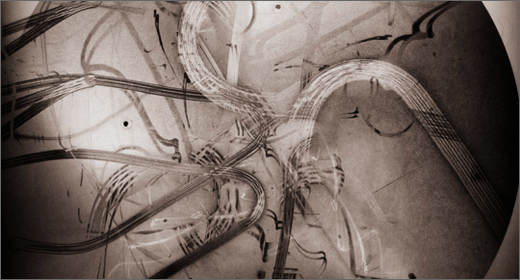


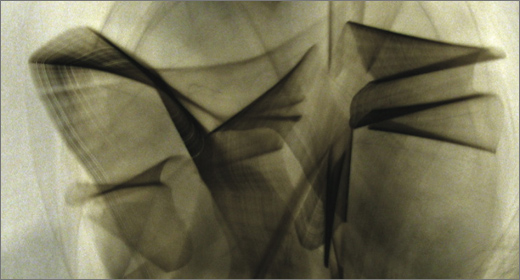
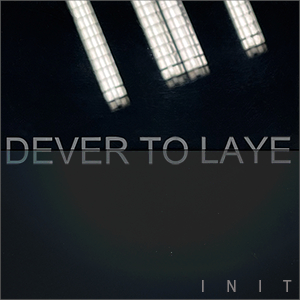

![Extrawelt :: AE-13 (Adepta Editions) — [concise]](https://igloomag.com/wp/wp-content/uploads/2025/04/extrawelt-ae-13_v_feat-75x75.jpg)
![Beyond the Black Hole :: Protonic Flux EP (Nebleena) — [concise]](https://igloomag.com/wp/wp-content/uploads/2025/04/beyond-the-black-hole-protonic-flux_feat-75x75.jpg)
![H. Ruine, Mikhail Kireev :: Imagined / Awakenings (Mestnost) — [concise]](https://igloomag.com/wp/wp-content/uploads/2025/04/h-ruine-mikhail-kireev-imagined-awakenings_feat2-75x75.jpg)


![Squaric :: 808 [Remixes] (Diffuse Reality) — [concise]](https://igloomag.com/wp/wp-content/uploads/2025/04/squaric-808-remixes_feat-75x75.jpg)


